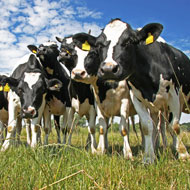
Dismay as badger cull is rolled out to 11 new areas
The incidence of bovine TB has fallen in Gloucestershire and Somerset, new data from the government suggests.
Defra says bTB levels in the two areas are now around half what they were before the four-year pilot badger culls began.
TB incidence in Gloucestershire fell from 10.4 per cent before culling started, to 5.6 per cent in year four of the cull. Meanwhile, in Somerset, levels fell from 24 per cent to 12 per cent.
Announcing the new figures, the government also revealed that licences have been granted for badger culls in 10 new areas within the High Risk Area. One additional licence has been granted within the Low Risk Area in Cumbria.
In addition, a new round of applications has opened for Badger Edge Vaccination Scheme grants. The scheme was suspended for two years after a global vaccine shortage, before resuming in 2017.
Farming minister George Eustice said: “Bovine TB remains one of the greatest animal health threats to the UK. There is no single measure that will provide an easy answer which is why we are committed to pursuing a wide range of interventions to protect the future of our dairy and beef industries and eradicate the disease within 20 years.
“No one wants to be culling badgers forever so the progress reported today is encouraging.
Staffordshire Wildlife Trust expressed “extreme dismay” that the county has now been granted a culling licence. Over 40,000 badgers could be culled by the end of 2018 as a result of the extension of the cull to new areas, the trust added.
Julian Woolford, chief executive, Staffordshire Wildlife Trust, said: “It is unacceptable that the government has not waited for the results of their own review – which we understand is to be published imminently – before forging ahead with another year of ineffective and expensive badger culling.
“The badger cull is a dangerous distraction from addressing the main route of bTB transmission in cattle which is between cattle.”
Senior policy manager Ellie Brodie added: “We’re calling on the government to invest in medicine, not marksmen. The costs of killing badgers are much higher than vaccinating them – it costs £496.51 to kill a badger compared with £82 to vaccinate a badger.”



 The veterinary mental health charity Vetlife is inviting the veterinary community to join it for a sponsored cold-water dip.
The veterinary mental health charity Vetlife is inviting the veterinary community to join it for a sponsored cold-water dip.